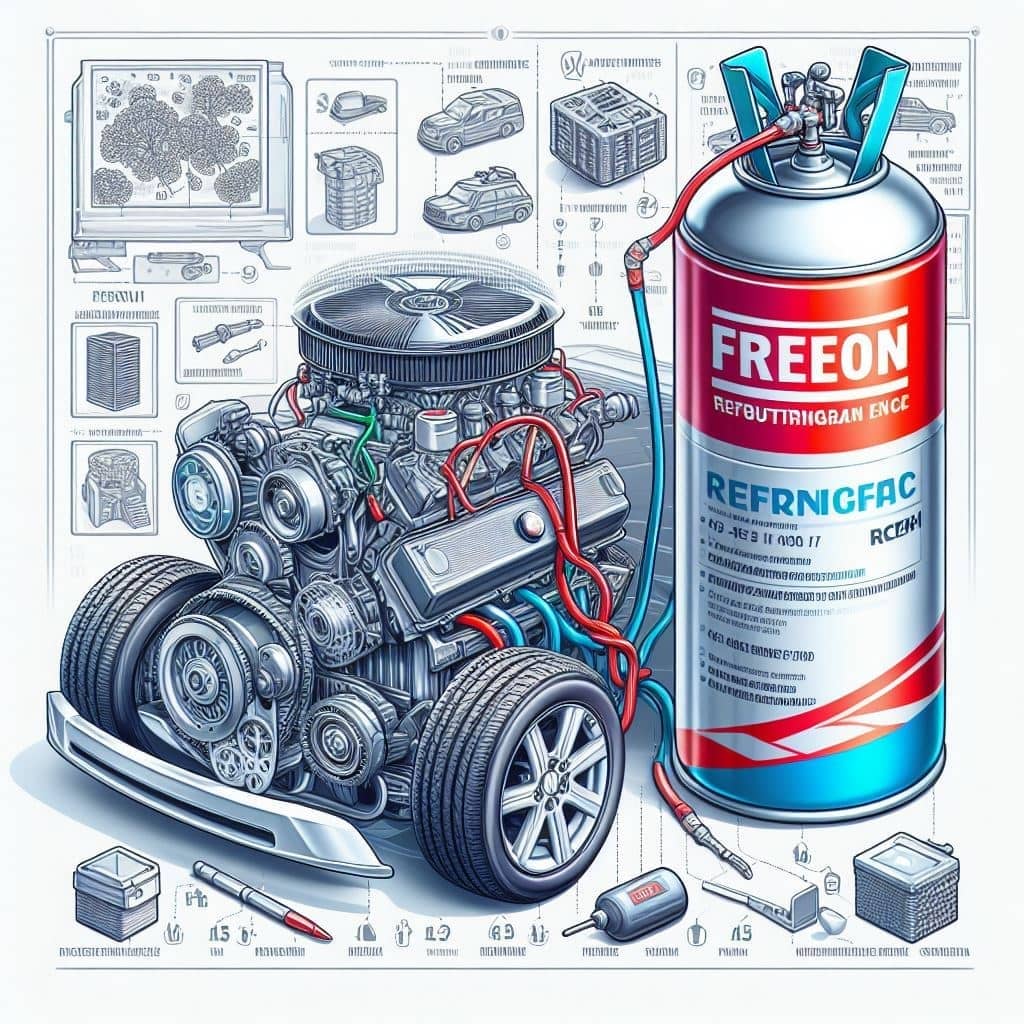In this article, we dive into the secrets and essential information about freon for car AC systems.
Did you know that over 87% of car owners are unaware of the critical role freon plays in their car’s air conditioning (AC) system?
Freon, a refrigerant responsible for cooling the air in your car, is often overlooked and misunderstood.
Discover its importance, learn how to identify low freon levels, and uncover the secrets to achieving efficient cooling in your car.
Key Takeaways:
- Freon is a crucial component in your car’s AC system for efficient cooling.
- Identifying low freon levels is essential to prevent AC system damage.
- Regular air filter replacement is vital for maintaining optimal freon levels.
- Understanding the freon recharge process can save you time and money.
- Proper AC system maintenance ensures longevity and optimal performance.
Understanding Freon: Its Importance in Car AC Systems
When it comes to the efficient cooling of your car, understanding freon and its role in the air conditioning (AC) system is essential.
Freon, a type of refrigerant gas, plays a vital role in the cooling process and helps maintain optimal car AC performance.
By gaining a comprehensive understanding of freon and its properties, you can ensure long-lasting, efficient cooling for a comfortable driving experience.
Freon: The Key to Efficient Cooling
Freon, also known as R-134a, is the most commonly used refrigerant in car AC systems.
It serves as the heat transfer medium responsible for absorbing heat from the air inside your car and releasing it outside.
Without freon, the AC system would be unable to cool the air effectively, leaving you uncomfortable in hot weather or during long drives.
Understanding the properties of freon is crucial in grasping its role in the cooling process.
Freon has low boiling and freezing points, allowing it to cycle between its gaseous and liquid states under varying temperatures and pressures.
This phase change enables efficient heat absorption and dissipation, resulting in cool air circulating within your car.
The Functions of Freon in Car AC Systems
Freon performs several vital functions within your car’s AC system:
- Heat absorption: Freon absorbs heat from the warm air inside your car, causing the gas to undergo a phase change from a gas to a liquid.
- Heat dissipation: The liquid freon carries the absorbed heat to the condenser, where it releases the heat to the outside environment, converting it back into a gas in the process.
- Heat conversion: As the freon is pressurized, it transitions back to a high-pressure gas, allowing it to absorb heat once again in the evaporator, providing continuous cooling.
Understanding these functions and the continuous cycle of freon in your car’s AC system will enable you to appreciate the importance of maintaining optimal freon levels for efficient cooling.
Maintaining Freon Levels for Efficient Cooling
Proper maintenance of freon levels is crucial to ensure the efficient functioning of your car’s AC system.
Low freon levels can lead to inadequate cooling performance, reduced air circulation, and overall discomfort during hot weather or extended periods of driving.
Regularly checking and recharging freon levels is essential to maintain optimal cooling.
If you suspect that your car’s AC system may have low freon levels, it is advisable to consult a professional technician who can accurately diagnose and address any issues.
By understanding the importance of freon and its role in your car’s AC system, you can take proactive measures to ensure efficient cooling and a comfortable driving experience even in the hottest temperatures.
Signs of Low Freon Levels and How to Identify Them
It’s essential to be able to recognize the signs that indicate low freon levels in your car’s AC system.
Identifying these signs early on can prevent further damage and ensure a comfortable driving experience.
Here are some telltale signs to watch out for:
1. Weak Cooling
If you notice that your car’s AC is not cooling as effectively as it used to, it could be a sign of low freon levels.
Your AC system relies on a sufficient amount of freon to cool the air before it is circulated into the cabin.
Insufficient freon levels can result in weaker airflow and less effective cooling.
2. Longer Cooling Times
If it takes longer than usual for your car’s AC system to cool the interior, low freon levels may be the culprit.
When freon levels are low, it puts additional strain on the AC system, causing it to work harder and take longer to achieve the desired temperature.
3. Warm Air from Vents
If you feel warm air coming out of your car’s vents instead of cold air, it’s a clear indication of low freon levels.
The lack of sufficient freon can prevent the AC system from cooling the air properly, resulting in warm or lukewarm air blowing into the cabin.
4. AC Compressor Cycling Frequently
If your AC compressor is cycling on and off more frequently than usual, it could be a sign of low freon levels.
The AC compressor is responsible for pressurizing the freon and circulating it through the system.
When freon levels are low, the compressor may have to work overtime to maintain the desired pressure, leading to frequent cycling.
5. Ice Buildup on AC Components
Ice buildup on the components of your car’s AC system, such as the refrigerant lines or evaporator coil, is a clear sign of low freon levels.
When freon levels are insufficient, the AC system gets colder than intended, causing the condensation on the components to freeze and form ice.
Ignoring low freon levels can have detrimental effects on your car’s AC system, leading to further damage and costly repairs.
Therefore, it’s crucial to address the issue promptly to maintain optimal cooling performance.
“Low freon levels in your car’s AC system can have serious consequences if not addressed promptly. It’s important to keep an eye out for these signs and take the necessary steps to fix the issue.”
– John Peterson, Automotive Expert
Consulting a professional mechanic is recommended if you suspect low freon levels in your car’s AC system. They have the expertise and tools to accurately diagnose the problem and recharge the freon if necessary.
| Signs of Low Freon Levels | Potential Consequences |
|---|---|
| Weak cooling | Less effective cooling, discomfort during hot weather |
| Longer cooling times | Inefficient AC system, increased strain on the compressor |
| Warm air from vents | Lack of cooling, discomfort while driving |
| AC compressor cycling frequently | Reduced AC system lifespan, increased energy consumption |
| Ice buildup on AC components | Potential damage to AC system, restricted airflow |
The Freon Recharge Process: When and How to Do It
As a car owner, it is important to understand when and how to recharge freon in your car’s AC system.
Recharging freon helps restore the cooling efficiency of your AC system and ensures a comfortable driving experience.
Here, we will guide you through the step-by-step process of freon recharge and provide insights into the signs that suggest it is time for a recharge.
When to Recharge Freon
- Freon levels naturally diminish over time, so it is essential to monitor them regularly. Some indicators that your AC system may require a freon recharge include:
- Insufficient cooling: If you notice that your car’s AC is not providing the desired level of cooling, it is a sign that freon levels may be low.
- Longer cooling time: If your AC system takes longer than usual to cool down the car, it may be due to low freon levels.
- Audible hissing sounds: Freon leaks can result in hissing sounds coming from your AC system. These leaks should be addressed promptly, and a freon recharge may be necessary.
- Faulty AC components: If there are any issues with the AC compressor or other components, it can cause freon to leak, requiring a recharge.
The Freon Recharge Process
- Ensure safety: Start by ensuring you have the necessary safety equipment, such as gloves and protective eyewear, to handle freon safely.
- Locate the low-pressure port: Identify the low-pressure port in your car’s AC system. It is usually found on the larger AC line near the AC compressor.
- Prepare the system: Start the car and turn on the AC system to the maximum cooling setting.
- Connect the gauge and hose: Connect the freon recharge kit’s gauge and hose to the low-pressure port.
- Read the gauge: Read the gauge on the freon recharge kit to check the current freon levels in the system.
- Recharge freon: If the freon levels are low, follow the instructions on the recharge kit to add the appropriate amount of freon to the system.
- Monitor the gauge: As you add freon, monitor the gauge to ensure you reach the recommended freon levels for your specific car make and model.
- Disconnect and check cooling: Once the freon recharge is complete, disconnect the recharge kit, and check the cooling performance of your AC system.
It is important to note that if you are unfamiliar or uncomfortable with the freon recharge process, it is recommended to seek professional assistance from a certified technician.
They have the expertise and equipment to perform the recharge safely and accurately.
Regularly monitoring freon levels and scheduling recharge when necessary can help maintain optimal cooling performance in your car’s AC system.
Stay mindful of the signs of low freon levels and take prompt action to recharge freon, ensuring a comfortable and enjoyable driving experience.
| Signs of Low Freon Levels | The Freon Recharge Process |
|---|---|
| Insufficient cooling | Ensure safety |
| Longer cooling time | Locate the low-pressure port |
| Audible hissing sounds | Prepare the system |
| Faulty AC components | Connect the gauge and hose |
Importance of Proper AC System Maintenance

In order to ensure optimal performance and longevity of your car’s AC system, proper maintenance is crucial.
Regularly inspecting and maintaining various components of the AC system is essential to ensure efficient cooling and prevent issues from arising.
Inspecting and Maintaining AC Components
The AC system in your car consists of several key components that need to be regularly checked and maintained.
- Compressor: The compressor plays a vital role in the AC system by pressurizing and circulating the refrigerant, including the freon. Regularly inspecting the compressor for any leaks or damage and ensuring it is well lubricated can help prevent future issues.
- Condenser: The condenser is responsible for releasing heat absorbed from the car’s interior. Regularly cleaning the condenser to remove any debris or dirt buildup is important to maintain optimal cooling efficiency.
- Evaporator: The evaporator helps cool down the air before it is distributed into the car’s cabin. Ensuring that the evaporator is clean and free from any obstructions is necessary to maintain effective cooling.
- Filters: Filters play a crucial role in maintaining freon levels and ensuring clean air circulation. Regularly replacing or cleaning air filters and cabin filters can improve the overall performance of the AC system.
- Hoses and Connections: Inspect hoses and connections for any signs of leaks or damage. Identifying and fixing any issues promptly can prevent refrigerant loss and maintain proper AC system functioning.
By regularly inspecting and maintaining these components, you can keep your car’s AC system in optimal condition, ensuring efficient cooling and a comfortable driving experience.
Proper AC system maintenance is crucial for optimal performance and longevity. Regularly inspect and maintain various components of your car’s AC system, including the compressor, condenser, evaporator, filters, hoses, and connections, to ensure efficient cooling and prevent potential issues.
The Role of Filters in Maintaining Freon Levels
Filters play a crucial role in maintaining optimal freon levels and ensuring the overall health of your car’s AC system.
By regularly replacing filters, you can contribute to the efficient functioning of your car’s AC system and enhance its cooling performance.
Filters serve as barriers, preventing contaminants such as dust, pollen, and debris from entering the AC system.
These contaminants can hinder the proper flow of freon and compromise the cooling efficiency of your car’s AC system.
When filters become clogged or dirty, they restrict the passage of air and put additional strain on the AC system components, including the compressor.
This strain can lead to higher energy consumption, increased wear and tear, and potentially costly repairs.
Regularly replacing filters is a simple yet effective way to maintain freon levels and optimize the performance of your car’s AC system.
By doing so, you can:
- Improve air quality inside your car
- Ensure consistent and efficient cooling
- Extend the lifespan of your car’s AC system
Filters are typically inexpensive and easy to replace.
It is recommended to consult your car’s manual or seek professional guidance to identify the appropriate filter type and replacement frequency for your specific make and model.
By prioritizing the maintenance of filters in your car’s AC system, you can enjoy a comfortable and refreshing driving experience while maintaining optimal freon levels.
| Benefits of Replacing Filters Regularly | Consequences of Neglecting Filter Maintenance |
|---|---|
| Improved air quality and reduced allergens | Poor air quality and potential health issues |
| Enhanced cooling performance | Reduced cooling efficiency and uneven cooling |
| Lower energy consumption | Higher energy consumption and increased costs |
| Extended lifespan of the AC system | Increased wear and tear and potential breakdowns |
Common AC Problems and How Freon is Affected
While your car’s air conditioning (AC) system is designed to provide cool, refreshing air, it is not immune to problems that can arise over time.
Understanding these common AC problems and their impact on freon levels is crucial for maintaining optimal cooling in your vehicle.
Clogged AC Condenser
One of the most common AC problems is a clogged condenser.
The condenser plays a vital role in the cooling process, dissipating the heat that is extracted from the interior of your car.
When the condenser becomes obstructed by dirt, debris, or insects, its efficiency is compromised, leading to inadequate cooling and increased strain on the AC system.
| Signs of a Clogged Condenser | Impact on Freon |
|---|---|
| Poor cooling performance | Increased strain on the AC system, potentially causing freon leaks |
| AC system cycling frequently | Decreased freon levels, resulting in reduced cooling capacity |
| AC system blowing warm air | Freon depletion, leading to inefficient cooling |
Leaking AC System
Another common issue in car AC systems is refrigerant leaks. Whether due to damaged hoses, fittings, or seals, these leaks can result in a loss of freon over time.
As freon levels decrease, your AC system’s ability to cool the air becomes compromised, making it less effective in hot weather conditions.
| Signs of an AC System Leak | Impact on Freon |
|---|---|
| Visible oil or freon stains | Reduced freon levels, leading to inadequate cooling |
| Foul smell inside the car | Freon leakage, potentially harmful to the environment |
| AC system unable to maintain cold air | Freon depletion, resulting in warm air blowing from the vents |
Loose or Damaged Belts
The belts in your car’s AC system are responsible for transmitting power from the engine to the compressor, which pressurizes the freon.
Over time, these belts can become loose or damaged, affecting the overall performance of the AC system and freon distribution.
| Signs of Loose or Damaged Belts | Impact on Freon |
|---|---|
| Noise coming from the engine area | Reduced freon circulation, leading to insufficient cooling |
| Inconsistent cooling performance | Inadequate freon levels, resulting in fluctuating air temperature |
| AC system not engaging | Restricted freon flow, causing the AC system to malfunction |
By being aware of these common AC problems and their impact on freon levels, you can take proactive measures to prevent or address them promptly.
Regular maintenance and inspections, along with professional servicing when necessary, will help ensure that your car’s AC system operates efficiently and provides optimal cooling for a comfortable driving experience.
The Role of Compressors in Freon Distribution
Understanding the role of compressors is essential when it comes to the distribution of freon in your car’s AC system.
Compressors are responsible for pressurizing the freon gas, allowing it to circulate throughout the system and facilitate the cooling process.
Compressors work by compressing the low-pressure freon gas, which increases its temperature and pressure.
This compressed gas is then sent to the condenser, where it releases heat and transforms into a high-pressure liquid.
The liquid freon then moves to the evaporator, where it absorbs heat from the surrounding air, cooling it down in the process.
By effectively regulating the flow and pressure of freon, compressors play a crucial role in ensuring efficient cooling in your car’s AC system.
A malfunctioning or faulty compressor can lead to inadequate distribution of freon, resulting in reduced cooling performance and discomfort for you and your passengers.
Regular maintenance and inspection of compressors are essential to prevent potential issues that can impact freon distribution.
If you notice any unusual noises, reduced cooling performance, or a complete lack of cold air from your car’s AC system, it’s important to have your compressor checked and repaired by a qualified technician.
By understanding the role of compressors in freon distribution, you can ensure that your car’s AC system is operating at its best, providing you with optimal cooling and comfort during your journeys.
Proactive Maintenance Tips for a Healthy AC System
Regular maintenance is key to ensuring a healthy and efficient AC system in your car. By following these proactive maintenance tips, you can extend the life of your system and keep it running smoothly for years to come.
- Keep it clean: Regularly clean the AC vents and filters to prevent dust and debris from clogging the system. This will improve airflow and maintain optimal cooling performance.
- Check the refrigerant levels: Monitor the freon levels in your AC system to ensure they are within the manufacturer’s recommended range. Low freon levels can lead to reduced cooling capacity, so if you notice a decrease in cooling efficiency, it may be time for a recharge.
- Inspect the compressor: The compressor is the heart of your AC system. Regularly check for any signs of damage or leaks. If you notice any issues, it’s important to address them promptly to prevent further damage.
- Don’t forget about the condenser: The condenser plays a crucial role in dissipating heat from the refrigerant. Clean the condenser fins regularly to remove dirt and debris that may restrict airflow.
- Replace worn-out components: Over time, various components of your AC system, such as the belts and hoses, can wear out. Inspect them regularly and replace any worn-out parts to prevent system failure.
- Check for leaks: Periodically inspect the AC system for any signs of leaks. Low refrigerant levels are often indicative of a leak, which should be addressed immediately to avoid further damage.
- Pay attention to strange noises or smells: Unusual noises or strong odors when running your AC system may indicate underlying issues. If you notice anything out of the ordinary, it’s best to have it checked by a professional.
By following these proactive maintenance tips, you can ensure a healthy AC system in your car, prolong its lifespan, and enjoy comfortable and efficient cooling on every drive.
DIY Freon Check: Is It Possible?
If you’re wondering whether it’s possible to conduct a DIY freon check to monitor and maintain optimal freon levels in your car’s AC system, the answer is yes.
However, there are some limitations and potential risks associated with this approach that you need to be aware of.
Checking the freon levels in your car’s AC system is essential for ensuring efficient cooling and preventing potential issues.
By monitoring the freon levels regularly, you can detect any abnormalities and take appropriate action to address them.
But before you embark on a DIY freon check, here are a few things to consider:
1. Limited Access to Equipment:
A professional AC technician has specialized tools and gauges to accurately measure freon levels. As a DIYer, you may not have access to these tools, making it challenging to get precise readings.
2. Potential Health Risks:
Freon is a refrigerant that can be hazardous if mishandled or released into the environment. It is important to take proper precautions, such as wearing gloves and safety goggles, when handling freon.
In addition, freon leaks can lead to the release of harmful gases, posing health risks to you and the environment.
3. Lack of Expertise:
AC systems are complex, and diagnosing freon-related issues requires expertise and knowledge.
Without the necessary understanding of how AC systems work, you may misinterpret the readings or fail to identify potential problems.
4. Potential Damage to the AC System:
Mishandling the freon check process can result in damage to your car’s AC system.
Accidental overcharging or undercharging of freon can lead to system malfunctions, decreased cooling performance, and expensive repairs.
While it’s possible to conduct a DIY freon check, it’s crucial to weigh the advantages and disadvantages. If you’re not confident in your abilities or don’t have the necessary tools, it’s best to leave this task to a professional AC technician.
They have the expertise and equipment to perform accurate freon checks and ensure the overall health of your car’s AC system.
Benefits of Professional AC System Servicing
When it comes to maintaining your car’s AC system, professional servicing offers a range of benefits that ensure optimal performance and cooling efficiency. Entrusting your AC system to experts with specialized tools and expertise can save you time and money in the long run. Here are some key advantages of professional AC system servicing:
- Expert Knowledge: Professional technicians have in-depth knowledge of car AC systems and the complexities of freon distribution. They can accurately diagnose issues, identify low freon levels, and provide effective solutions.
- Specialized Tools: Professionals have access to advanced diagnostic tools and equipment that can accurately measure freon levels and assess the overall health of your AC system. These tools ensure precise servicing and maintenance.
- Efficient Repairs: By relying on professional AC system servicing, you can be confident that repairs will be conducted efficiently and effectively. This helps prevent potential breakdowns and extends the lifespan of your AC system.
- Preventive Maintenance: Professionals can perform routine inspections and maintenance to ensure your AC system is functioning optimally. This proactive approach helps prevent major issues and keeps your car’s AC system in top condition.
“Professional AC system servicing provides expert knowledge, specialized tools, efficient repairs, and preventive maintenance for optimal cooling efficiency.”
By opting for professional AC system servicing, you can enjoy the peace of mind that comes with knowing your car’s AC system is in good hands. Regular servicing not only keeps your AC system functioning efficiently but also helps maintain proper freon levels for optimal cooling performance while maximizing the lifespan of the system.
Environmental Concerns and Freon Replacement Options
As we become increasingly aware of the impact of human activities on the environment, it is essential to address the environmental concerns associated with the use of freon in-car air conditioning (AC) systems.
Freon, also known as chlorofluorocarbon (CFC), is a potent greenhouse gas that contributes to the depletion of the ozone layer.
To tackle these environmental concerns, the automotive industry is undergoing a transition towards more environmentally friendly alternatives to freon. Several replacement options have been introduced, such as hydrofluorocarbons (HFCs) and hydrofluoroolefins (HFOs), which have lower global warming potential and ozone depletion potential compared to freon.
To understand the impact of freon replacement options on the performance of car AC systems, let’s take a closer look at the characteristics and benefits of each:
| Replacement Option | Characteristics | Benefits |
|---|---|---|
| Hydrofluorocarbons (HFCs) | Chemically stable, non-toxic, and non-flammable | Reduced global warming potential and ozone depletion potential |
| Hydrofluoroolefins (HFOs) | Low toxicity and flammability, energy-efficient | Significantly lower global warming potential and ozone depletion potential compared to freon |
These freon replacement options offer a more sustainable solution for car AC systems, mitigating the environmental impact associated with freon use.
However, it’s worth noting that the transition to new refrigerants may require system modifications or retrofits to ensure compatibility and optimal performance.
By adopting these greener alternatives, we can contribute to reducing greenhouse gas emissions and preserving the ozone layer, while still enjoying efficient and comfortable cooling in our cars.
Maintaining Optimal Coolant Levels in Car AC Systems
When it comes to your car’s air conditioning (AC) system, maintaining optimal coolant levels is crucial for efficient cooling.
Coolant, also known as freon, plays a vital role in the overall cooling process and helps regulate the temperature inside your vehicle.
By understanding the importance of maintaining optimal coolant levels, you can ensure a comfortable driving experience even on the hottest days.
Coolant, or freon, is a specialized refrigerant that circulates through your car’s AC system to absorb heat from the air inside your vehicle.
It then transfers this heat outside, cooling down the air before it enters your car’s cabin.
As the coolant passes through the system, it undergoes phase changes, converting from a gas to a liquid and back again, allowing for efficient heat transfer.
To maintain optimal coolant levels, it’s essential to regularly check and monitor the amount of freon in your AC system.
Low coolant levels can lead to decreased cooling performance, causing your AC system to struggle to keep your car cool.
This can result in reduced comfort, especially on hot summer days.
One way to ensure optimal coolant levels is to have regular maintenance checks performed by a professional technician.
They can assess the state of your AC system, check the freon levels, and recharge the coolant if necessary.
Regular inspections and maintenance can help identify any potential issues before they escalate into costly repairs.
In addition to professional servicing, there are a few signs you can look out for that may indicate low coolant levels in your AC system.
These include diminished cooling performance, longer AC runtime without reaching the desired temperature, and unusual noises coming from the AC unit.
Signs of Low Coolant Levels:
- Diminished cooling performance
- Extended AC runtime without achieving the desired temperature
- Unusual noises from the AC unit
If you notice any of these signs, it’s important to address the issue promptly to prevent further damage to your AC system.
Seeking professional assistance is recommended to accurately diagnose and rectify the problem.
By maintaining optimal coolant levels in your car’s AC system, you can ensure efficient cooling, enhance performance, and extend the lifespan of your AC components.
Regular maintenance checks and prompt action in response to low coolant levels will help keep you cool and comfortable during your drives, no matter the outside temperature.
Optimizing AC Performance in Extreme Weather Conditions

When extreme weather conditions strike, it is crucial to ensure that your car’s AC system is functioning at its best.
The performance of your AC system can significantly impact your comfort level and overall driving experience during harsh temperatures.
Understanding the role of freon and implementing effective strategies can help you optimize AC performance even in extreme weather conditions.
Monitoring Freon Levels: Freon, also known as refrigerant, plays a vital role in cooling your car’s AC system.
It is responsible for absorbing and releasing heat, allowing the air to cool down before reaching you.
In extreme heat, the demand on your AC system increases, which can put pressure on freon levels. It is essential to monitor and maintain optimal freon levels to ensure efficient cooling.
Regular Maintenance: Proper maintenance is the key to keeping your AC system running smoothly in extreme weather conditions.
Schedule regular check-ups and servicing to identify any potential issues early on.
This includes inspecting freon levels, cleaning filters, and ensuring that all components are in good working condition.
Regular maintenance can prevent problems that may arise due to extreme weather and help maintain optimal AC performance.
Insulation and Shade: Park your car in shaded areas whenever possible to minimize the impact of extreme heat on your AC system.
Proper insulation is also crucial in keeping the cool air inside the car. Ensure that any gaps or cracks in windows, doors, or seals are sealed properly.
This will help maintain the desired temperature and reduce the strain on your AC system during extreme weather conditions.
Proper Ventilation: Maximize the efficiency of your AC system by utilizing proper ventilation techniques.
If possible, use the recirculation mode to keep the cool air inside the car instead of drawing in hot air from outside.
This can help your AC system work more effectively in extreme weather conditions.
Tip: When starting your car on a hot day, open the windows briefly to let out the hot air before turning on the AC. This can help reduce the initial load on your AC system and make the cooling process more efficient.
Comparing Cooling Efficiency in Extreme Weather Conditions
| Factors | Impact on Cooling Efficiency |
|---|---|
| Freon Levels | Low freon levels can lead to decreased cooling efficiency and compromised AC performance. |
| Insulation | Poor insulation can result in hot air entering the car and increasing the load on the AC system. |
| Shading | Parking in shaded areas reduces the heat load on the car and eases the strain on the AC system. |
| Ventilation | Proper ventilation techniques can enhance the efficiency of the AC system, allowing for better cooling. |
By effectively managing freon levels, conducting regular maintenance, optimizing insulation and shade, and utilizing proper ventilation techniques, you can optimize AC performance in extreme weather conditions.
These strategies will help you stay cool and comfortable during hot summer days, creating an enjoyable driving experience even in the harshest temperatures.
Conclusion
Throughout this article, we’ve explored the mysteries and essential information surrounding freon for car air conditioning (AC) systems.
Freon plays a crucial role in the efficient cooling of your car, and understanding its importance is vital for proper AC maintenance.
By recognizing the signs of low freon levels and promptly addressing them, you can prevent potential damage to your AC system and ensure optimal performance.
Regular freon recharging, when necessary, can help maintain efficient cooling in your car.
Proper AC system maintenance, including regular filter replacements and proactive maintenance tips, is essential for extending the lifespan of your car’s AC system.
Additionally, understanding the impact of common AC problems and the role of compressors in freon distribution can help you prevent issues and improve cooling efficiency.
While DIY freon checks are possible, it is recommended to seek professional AC system servicing for a thorough inspection and expert maintenance.
Moreover, as we continue to address environmental concerns, exploring alternative freon replacement options that are more eco-friendly becomes increasingly important.
In conclusion, regular maintenance, understanding the role of freon, and taking proactive measures are key to achieving efficient cooling and a comfortable driving experience in your car.
By staying informed and implementing proper AC system care, you can enjoy optimal performance and prolong the lifespan of your car’s air conditioning system.
FAQ
What is the role of freon in a car’s air conditioning (AC) system?
Freon, also known as refrigerant, plays a crucial role in absorbing heat from the air inside your car’s AC system and releasing it outside.
It undergoes a continuous cycle of compression and expansion, allowing it to cool down the air inside your car.
How can I identify low freon levels in my car’s AC system?
There are several signs that indicate low freon levels, including warm air blowing from the vents, reduced cooling capacity, unusual noises coming from the AC system, and frost buildup on the refrigerant lines.
If you notice any of these signs, it’s important to have your freon levels checked and addressed promptly.
When should I recharge the freon in my car’s AC system?
You should recharge the freon in your car’s AC system when you notice any signs of low freon levels or a decrease in cooling efficiency.
It’s recommended to consult a professional technician to assess the freon levels accurately and determine if a recharge is necessary.
Why is proper maintenance of the AC system important?
Proper maintenance of the AC system ensures efficient cooling performance, extends the life of the system, and prevents potential problems.
Regular inspections and maintenance can help identify issues early on and save you from costly repairs in the long run.
How often should I replace the filters in my car’s AC system?
It’s recommended to replace the filters in your car’s AC system every 12,000 to 15,000 miles or annually, depending on your driving conditions. Regularly replacing the filters helps maintain optimal freon levels and ensures clean air circulation inside the vehicle.
What are some common AC problems that can affect freon levels?
Common AC problems that can affect freon levels include refrigerant leaks, malfunctioning compressors, clogged condenser coils, and faulty expansion valves.
These issues can lead to decreased cooling efficiency and reduced freon levels in the system.
How do compressors affect the distribution of freon in a car’s AC system?
Compressors play a vital role in the distribution of freon throughout the AC system.
They compress the low-pressure refrigerant, increasing its temperature and pressure, before sending it to the condenser.
The condenser then cools down the freon, allowing it to absorb heat from the air inside the car.
What are some proactive maintenance tips for a healthy AC system?
Some proactive maintenance tips for a healthy AC system include regularly inspecting the system for any leaks, checking the refrigerant levels, cleaning the condenser coils, lubricating moving parts, and ensuring proper airflow by clearing any debris from the vents and ducts.
Is it possible to perform a DIY freon check to monitor freon levels?
Performing a DIY freon check can be challenging and potentially risky without the proper tools and expertise.
It’s best to consult a professional technician who can accurately check and monitor the freon levels in your car’s AC system.
What are the benefits of professional AC system servicing?
Professional AC system servicing offers several benefits, including accurate diagnosis of issues, specialized tools, and knowledge to address problems effectively, thorough maintenance to optimize cooling performance, and peace of mind knowing that your AC system is in the hands of experts.
What are the environmental concerns associated with freon, and are there alternative options?
Freon, specifically the chlorofluorocarbon (CFC) variant, has been found to contribute to ozone depletion.
As a result, alternative refrigerants, such as hydrofluorocarbons (HFCs) and hydrofluoroolefins (HFOs), are being adopted to reduce environmental impact.
These alternatives still provide efficient cooling while minimizing harm to the ozone layer.
Why is maintaining optimal coolant levels important in a car’s AC system?
Maintaining optimal coolant levels is important because coolant helps transfer heat between the air inside your car and the freon.
Insufficient coolant levels can lead to poor cooling performance and potentially damage other components of the AC system.
How can I optimize AC performance in extreme weather conditions?
To optimize AC performance in extreme weather conditions, you can minimize heat transfer by parking your car in shaded areas or using sunshades, pre-cooling your vehicle before driving and ensuring proper insulation and sealing of the AC system.
Additionally, regular maintenance and freon checks are crucial for efficient cooling during extreme temperatures.
You can also read:




